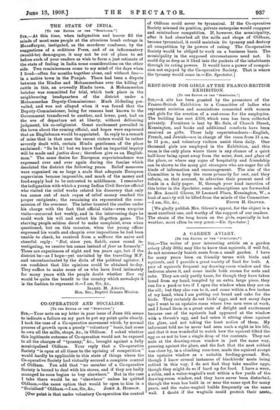THE STATE OF INDIA.
[To THE EDITOR OP THE " SPECTATOR."1 Sin,—At this time, when indignation and horror fill the minds of most sane people at the atrocious bomb outrage in Muzaffarpur, instigated, as the murderer confesses, by the suggestions of a seditious Press, and of an inflammatory (would-be) demagogue, it may not be out of place to set before such of your readers as wish to form a just estimate of the state of feeling in India some considerations on the other side. Two reminiscences come to my mind of the days when I lived—often for months together alone, and without fear— in a native town in the Punjab. There had been a dispute between the Hindus and Mohammedans over the killing of cattle in this, an avowedly Hindu town. A Mohammedan butcher was committed for trial, which took place in the neighbouring headquarters of the district under a Mohammedan Deputy-Commissioner. Much ill-feeling pre- vailed, and was not allayed when it was found that the Deputy-Commissioner, being for reasons best known to the Government transferred to another, and lower, post, had on the eve of departure set at liberty, without delivering judgment, his co-religionist. Great excitement prevailed in the town about the coming official, and hopes were expressed that an Englishman would be appointed. In reply to a remark of mine that in that case the recent rioters would be rather severely dealt with, certain Hindu gentlemen of the place exclaimed: " So be it ! but we know that an impartial inquiry will be made and justice done; therefore give us an English- man." The same desire for European superintendence was expressed over and over again during the famine which desolated the district the following years. Relief measures were organised on so large a scale that adequate European supervision became impossible, and much of the money and food-supply had to be entrusted to middlemen. I remember the indignation with which a young Indian Civil Service official who visited the relief works related his discovery that only ten annas out of each rupee of relief money reached the proper recipients ; the remaining six represented the com- mission of the overseer. The latter taunted the coolies under his charge with the fact that official visits—even surprise visits—occurred but weekly, and in the intervening days he could work his will and extort his ill-gotten gains. The starving people seldom dared to make complaint, even when questioned, but on this occasion, when the young officer expressed his wrath and chagrin over impositions he had been unable to check, he received from a sufferer the naive and cheerful reply: "But, since you, Sahib, came round in- vestigating, we receive ten annas instead of four as formerly." These are experiences of eight and ten years ago, but if the district be—as I hope—yet unvisited by the travelling M.P. and uncontaminated by the dicta of the political agitator, I am confident that like opinions could be obtained to-day. They suffice to make some of us who have lived intimately for many years with the people doubt whether Swa raj would be quite the benefit to the country which nowadays it is the fashion to represent it.—I am, Sir, &c.,
ISABEL M. ANODE,
Hon. Sec., Baptist Zenana Mission.






































 Previous page
Previous page